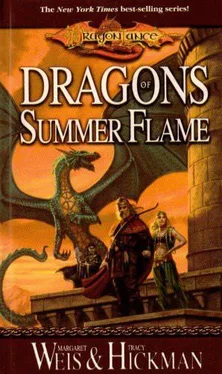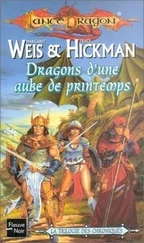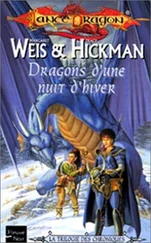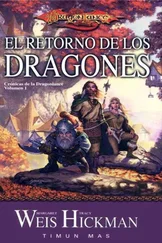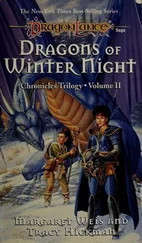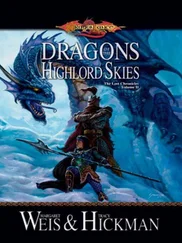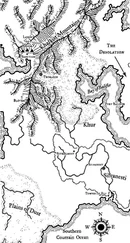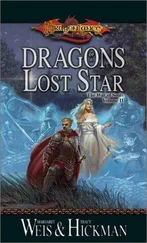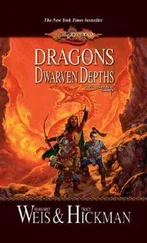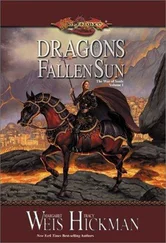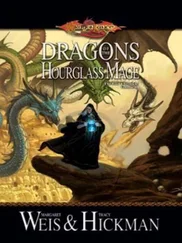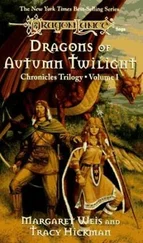Margaret Weis - Dragons of Summer Flame
Здесь есть возможность читать онлайн «Margaret Weis - Dragons of Summer Flame» весь текст электронной книги совершенно бесплатно (целиком полную версию без сокращений). В некоторых случаях можно слушать аудио, скачать через торрент в формате fb2 и присутствует краткое содержание. Жанр: Фэнтези, на английском языке. Описание произведения, (предисловие) а так же отзывы посетителей доступны на портале библиотеки ЛибКат.
- Название:Dragons of Summer Flame
- Автор:
- Жанр:
- Год:неизвестен
- ISBN:нет данных
- Рейтинг книги:4 / 5. Голосов: 1
-
Избранное:Добавить в избранное
- Отзывы:
-
Ваша оценка:
- 80
- 1
- 2
- 3
- 4
- 5
Dragons of Summer Flame: краткое содержание, описание и аннотация
Предлагаем к чтению аннотацию, описание, краткое содержание или предисловие (зависит от того, что написал сам автор книги «Dragons of Summer Flame»). Если вы не нашли необходимую информацию о книге — напишите в комментариях, мы постараемся отыскать её.
Dragons of Summer Flame — читать онлайн бесплатно полную книгу (весь текст) целиком
Ниже представлен текст книги, разбитый по страницам. Система сохранения места последней прочитанной страницы, позволяет с удобством читать онлайн бесплатно книгу «Dragons of Summer Flame», без необходимости каждый раз заново искать на чём Вы остановились. Поставьте закладку, и сможете в любой момент перейти на страницу, на которой закончили чтение.
Интервал:
Закладка:
Gilean imagined into being the race of humans. They have the shortest life span, are the quickest to change, and are easily swayed to one side or the other.
The Father, for his own amusement and to increase the likelihood of turmoil, created the animals. He greatly irritated his children by giving many of the animals advantages; chief among these being the dragons, who possess wisdom, intelligence, long life, magic, strength, and formidable weapons.
Since the arrival of dragons upon Krynn, the other mortal species have either fought the dragons or endeavored to ally with them.
Thus there came about the creation of balance in the world. The elves thought of themselves as the embodiment of “good,” while the ogres were the epitome of “evil.” (It is interesting to note that, in the ogre view of the world, this is entirely opposite. It is the ogres who see themselves as “good,” the elves and those like them, who advocate the extermination of the ogre race, as “evil.") Humans, in the middle, could be moved to join either side and did so—constantly.
Thus it is the humans, in whose blood mingle all the gifts of the gods—the need to exert control, ambition, desires, and the freedom of choice to use these in beneficial or detrimental ways—who race forward through time, creating, changing, altering, destroying. This is called progress.
It was also during this time that magic came into the world. Three of the children of the gods had grown up together and been unusually close: Solinari, son of Paladine and Mishakal; Nuitari, son of Takhisis and Sargonnas, and Lunitari, daughter of Gilean. All the gods possess the power of magic, but in these three that power was enhanced by their love for magic and their dedication to this art. This formed a bond between them, who were unlike in almost all other aspects.
When the All-Saints War occurred, these three were under pressure from their various parents to join one side or the other. The three cousins feared that the war would destroy the thing they loved most: magic. They took a vow to be true to the magic, faithful to each other, and they left the pantheon of the gods. Assuming mortal form, they walked the face of Krynn.
Each cousin found a follower among the mortals and to that follower each gave the gift of magic. This gift could be passed on to other mortals, and those mortals could, in times of need, call upon the three gods for assistance. Then the three cousins left Krynn, yet remained near it, circling in the heavens, watching over with unblinking eyes the mortals who use their gifts. Mortals know these “eyes” as Krynn’s three moons: the silver Solinari, the red Lunitari, and the unseen (except by his followers) Nuitari.
We Irda possess immensely strong magical powers, but we are not certain from whence the power emanates. We are not aligned with the wizards of Krynn and are, in fact, considered “renegades.” You see us as a threat, a danger to your orders. Our magic is one of the many reasons we shun contact with other species. Magic is crucial to our survival. Every Irda is born with it. Magic is in our blood, so to speak, and comes as naturally to us as do the other senses: seeing, smelling, hearing, touching, tasting. Are we asked to explain how we see? I see no reason for the world to demand that we explain how we perform what are, in their eyes, miracles.
To continue with the history of creation.
The new world was young and wild, as were the spirits of the mortals inhabiting it. The elves worked hard and subdued their part of the world. The ogres learned to adapt to theirs. Humans sought to craft their part and improve on it. Reorx—a lonely god—offered to assist them. It is said that the only time Reorx is truly happy is when he is mingling and interfering in the lives of mortals.
Reorx taught a group of humans innumerable skills, which included the technique of forging steel. The elves and ogres both coveted the metal, which neither of them knew how to produce. They came to the humans to buy steel swords, knives, tools. The humans grew immensely proud of their abilities and began to flaunt them. They forgot—in their pride—to honor Reorx, their teacher. They even shunned the god when he came among them, laughing at him because he was far shorter than they, ridiculing his interest in the very craft by which they were gaining so much wealth.
Infuriated, Reorx cursed these humans. He took from them the skills he had taught them, left them only with the desire to invent, build, construct. He decreed that these humans should be short, wizened, and ridiculed by other races. He changed them into gnomes.
During this time, known as the Age of Twilight, the balance of the world—which had been relatively stable—began to shift. No longer content with what they had, humans began to covet what their neighbors had. The ogres, incited by Takhisis, wanted power. The elves wanted to be left alone and were ready to fight to preserve their isolation.
Hiddukel was one of the gods of Beyond brought to this plane by Takhisis to increase her hold on humans. Hiddukel is a deal maker. He loves to deal and barter and is extremely good at it. He saw in the hiring of the scales of balance a way to increase his own power. War would be good for business, bringing about increased production of weapons, armor, food to feed the armies, and so forth. Since he was also a trader in the souls of the dead, Hiddukel could see a handsome profit to be made in that area as well.
Hoping to further the turmoil, Hiddukel went to Chislev, goddess of woodlands and nature, and—in his best persuasive manner—convinced her that doom was at hand.
“It’s only a matter of time before war breaks out,” he said dolefully. “And what will that do to the environment? Forests chopped down to make siege towers, saplings turned into bows and arrows, fields scavenged or set ablaze. We need to put a stop to this feuding among the races, once and for all. For the sake of nature, of course.”
“And what’s your stake in all this?” Chislev demanded. “I can’t believe you are interested in the welfare of baby bunnies.”
“No one gives me credit for having a heart,” Hiddukel complained.
“That’s because it’s difficult to see beneath the oil slick of your words,” Chislev retorted.
“If you must know, war would be extremely upsetting to the financial markets. The value of gold would plunge; it would be practically worthless. Farmers can’t get their goods to market if the markets are being invaded. And I’m very fond of rabbits.”
“In stews, maybe.” Chislev sighed. “Yet, you do have a point. I’ve seen the growing restlessness among the races, and I’ve been concerned about it myself. I’ve spoken to Gilean, but you know what that’s like! He never looks up from that book. He’s always writing, writing, writing.”
“Try to get a word in with Takhisis.” Hiddukel sniffed. “Either she’s off with Sargonnas, watching minotaur bash each other over the head or she’s bringing on plagues, famine, floods, what have you. She hasn’t time for the likes of us anymore.”
“What do you suggest we do? I take it you have a plan.”
“Don’t I always, my tree-hugging friend? If neutrality were the ruling force in the world, then the balance would remain constant, never shift. Agreed?”
“I suppose,” Chislev said cautiously, not trusting Hiddukel, but unable to argue the point. “But I don’t see—”
“Ah! Go to Reorx. Ask him to create a gem that will hold within it the very essence of neutrality. This gem will serve as an anchor to the neutral position. Neutrality will become the strongest force in Krynn, overwhelming the two opposite extremes. They’ll be bound to the center, will not be able to deviate far from it.”
“And what do we do with this gem once it’s created. Give it to you for safekeeping?” Chislev was a gentle goddess, but she had a tendency to be sarcastic, especially around Hiddukel.
Читать дальшеИнтервал:
Закладка:
Похожие книги на «Dragons of Summer Flame»
Представляем Вашему вниманию похожие книги на «Dragons of Summer Flame» списком для выбора. Мы отобрали схожую по названию и смыслу литературу в надежде предоставить читателям больше вариантов отыскать новые, интересные, ещё непрочитанные произведения.
Обсуждение, отзывы о книге «Dragons of Summer Flame» и просто собственные мнения читателей. Оставьте ваши комментарии, напишите, что Вы думаете о произведении, его смысле или главных героях. Укажите что конкретно понравилось, а что нет, и почему Вы так считаете.
